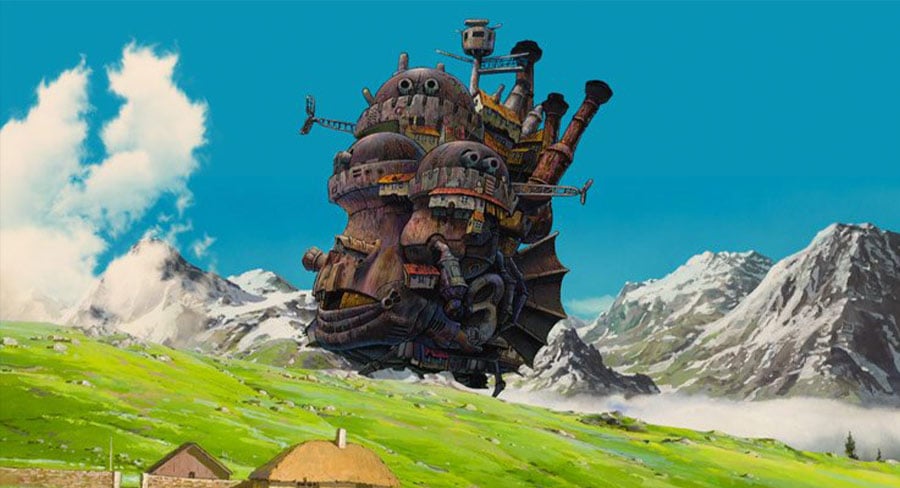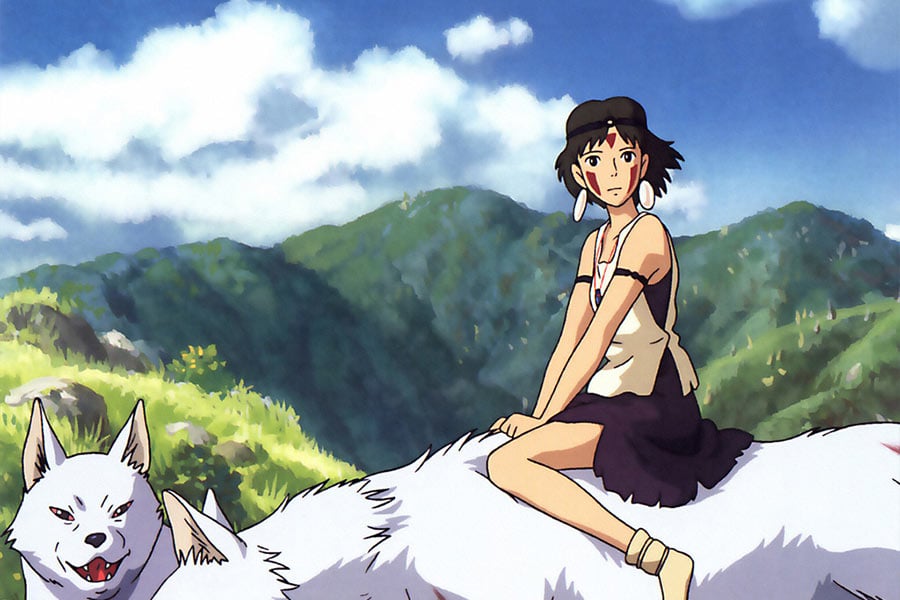These animated movies teach viewers about transformative love, mercy, and more

Over the past 35 years, Studio Ghibli has garnered critical acclaim across the world for crafting several artistically animated and thoughtfully scripted films. Throughout the Japanese studio’s 20 (and counting) movies, inspiring and selfless Christian themes are found in the fantastical world and its complex characters. Although I’d personally recommend nearly every Ghibli film as beneficial for both the heart and the soul, here are three that you and your family might find especially enriching.
Ponyo: A Lively Tale of Transformative Love
This fun-filled, award-winning children’s film from 2008 is a beautiful example of sacrificial love, friendship, and transformation.
In a loose adaptation of “The Little Mermaid,” we meet Ponyo the fish (voiced by Noah Cyrus), an ocean-dwelling princess filled with wonder and curiosity. She escapes from her loving and protective father to see the land, and there she encounters a young boy named Sosuke (voiced by Frankie Jonas). Their friendship is immediate and transformative, and through it, she starts to become human. Her father finds her and brings her back home, but in her desire to return to her new friend she escapes again but knocks over a collection of magic elixirs which mix into the ocean and endanger Sosuke’s town. The balance between the sea and the land is thrown off, and Sosuke’s mother goes missing. Together, Ponyo and Sosuke set out to find her.
This tale is one of incredible magic and friendship. In it, we see the love of both Sosuke’s and Ponyo’s parents for their children, Sosuke’s and Ponyo’s deep friendship, and the self-sacrifice that comes with genuine love for another. The Pauline Center for Media Studies says it exceptionally well:
“Through all their adventures, the innocent love between them sustains them through their daily escapades, and ultimately gives Ponyo the form she needs to fully thrive as herself. She becomes truly human, like the one who taught her to reach out in love, because of her true love for him. It’s a beautiful representation of the truth of our transformation in Christ. We love because God loves, because He is Love. And when we love Him, we are gradually transformed in Him, “becom[ing] the image of the beloved” (St. Clare of Assisi). And as reflected in Ponyo’s pure, unadulterated delight, there is no joy greater than this!”
This film is an absolute delight for all ages with its phenomenal soundtrack, magic, heartwarming story, and rich characters. This film gives something special to children — a beautiful view of friendship that is rare in modern media. It is devoid of romance, and yet it is self-sacrificing, whole-hearted, and full. It offers a positive view of the elderly, with our heroes treating them with love and respect. It shows friction between Ponyo and her father, but with resolution and clarity in that the hardships they faced were due to love, and not simply because of a “mean parent.” In Sosuke’s case, we have the opportunity to see that his mother is human, deeply loving, and that she treasures her son. The parents in this film are not inattentive, nor are they simply used as plot points or antagonists; rather, they are integral to the story and are beautiful in their expressions of love for their children.
One of the most straightforward ways we as humans can relate to the love of God is through limitless and unconditional parental love, so to see it exemplified so well through the relationships present within “Ponyo” is both a heartwarming and wonderful way for children to better understand the love their own parents and God the Father have for them.
Understanding the Lord’s love can be challenging, but films like these that portray so much affection and joyful sacrifice through a variety of relationships, while being utterly captivating, that it may help children comprehend selfless love a little bit better.

A scene from "Howl's Moving Castle."
Howl’s Moving Castle: How Self-Confidence Becomes Self-Gift
The Oscar-nominated “Howl’s Moving Castle” is a film filled with sorcery, magic, beauty, and war. Written with a message of peaceful pacifism as an undercurrent, director Hayou Miyazaki tells the story of a young, meek woman named Sophie who is cursed to transform into an elderly woman by a jealous witch.
Sophie, now frail, hires herself out as a house cleaner within the castle of a wizard, Howl, who is infamous in her village for stealing the hearts of women. The mysterious novelty of Howl quickly fades as viewers realize that he is as self-indulgent as Sophie is modest. Hilarious and heartwarming misadventures ensue as she develops a friendship with Howl and the other assorted members of the household.
The movie is a torrent of character development as Sophie finds self-confidence in herself. Howl concurrently learns to sacrifice for others through his newfound understanding that he is a gift in and of himself, apart from his good looks, charm, and magic. Although once pompous and frivolous, he grows in humility and love and becomes able to truly take care of those dearest to him. As both characters mature, it becomes apparent that to truly love each other well, they must first grow in self-confidence and love of self, so that they can give of themselves not out of a desire to be loved, but out of a genuine gift of self, just as Christ has done for us and asks us to do for our neighbors.
That theme of self-gift is refined through the mercy shown within “Howl’s Moving Castle.” The initial antagonist of the film, the Witch of the Waste, has her own misfortunes befall her, and though she does not cure Sophie of the curse she put on her, she joins their odd team of friends. Sophie, for her part, takes care of the witch, feeds her, talks to her, and is gentle with her, even defending the witch to others in the group. It is through these acts of mercy that a number of curses are lifted at the end of the movie, and we see both that Sophie has grown in confidence and her ability to love others well. These themes are especially important for children.
The virtue of humility is frequently misunderstood, with the idea that to be modest, one must look down on oneself. But “Howl’s Moving Castle” shows a humility imbued with rightful confidence, in which the characters come to truly know themselves, love themselves, and then give of themselves to others with love and sacrifice. This is an important lesson for young people to learn as they form connections and build relationships, demonstrating Christ-like sacrifice and confidence in the fact that they are good, beautiful, and worthy because God has created them as such.

A scene from "Princess Mononoke."
Princess Mononoke: Environmentalism and God’s Presence in Nature
With the film’s 25th anniversary this past April, I felt that this was a perfect time to look into the deeply Christian themes and messages of director Hayou Miyazaki’s 1997 epic historical fantasy film “Princess Mononoke.”
Not only is this film visually riveting and carried by a beautiful soundtrack, but it’s also incredibly emotionally and spiritually moving. I can firmly say it has moved my soul for the better through its unique presentation of the intersection between nature, the spiritual, and humanity. It should be noted, however, that there are depictions of violence and the subject matter can be disturbing for younger children. As a PG-13 rated movie, it’s a phenomenal watch for older teens and adults.
In opening scenes, viewers are immediately thrown into a dangerous world, and we watch our protagonist save his village from an enraged demon, incurring a deadly curse in the process. The main character, Ashitaka, leaves his small village and travels out west to find a cure, where he finds himself immersed in a deep battle between humankind and nature. We encounter a slew of complex and well-formed characters, both humans and gods of the forest, who, in this context, are protectors of nature or the spirits of nature itself.
Through this journey, although there is great conflict, we never quite meet a bad guy. This is one of the parts of “Princess Mononoke” that makes it so human, despite its extreme fantasy elements. In this battle between beast and people, no creature is depicted as completely corrupt per se, but characters make selfish and ill-guided decisions that result in conflict. The leader of the town of humans ruthlessly attempts to kill the forest spirit in order to cut down trees, yet she also saves women from prostitution and lepers from death. The princess of the forest, meanwhile, attempts to protect nature from humans, but she is utterly ruthless in her actions.
In the progression of the movie, we watch Ashitaka befriend spirits and humans alike, and act as a liaison between the two groups. The movie does not resolve with complete peace between humans and nature — both the forest and the town are severely damaged by the end of this film, and Ashitaka maintains a foot in both worlds, still distinct and unyielding. The ending is inconclusive, and it is one of hope rather than resolution.
The ending reminds us that the spirit of the forest is always present in the grass, the trees, and flowers, even when we are not able to see it. This serves as a wonderful reminder for Christians that God is not gone when we don’t see Him; He’s alive and well, fully present in all that is good. He’s in nature, and He’s in us. Even in times when we feel spiritual desolation, we are not alone.
“Princess Mononoke” does not conclude with a neatly wrapped ending. The forest and the people are not friends. But this is important. I think the point goes beyond a “feel-good” ending — it is meant to inspire us to carry on these lessons because this tension between man and nature is not yet resolved.
We can take Miyazaki’s Shinto-inspired personification of the wilderness and of nature and instead see our God. We can see the good and the bad in humankind’s desire for progress, and we can work to bridge the divide between the goodness of nature and of human advancement. We can be more understanding of those around us who impede our progress rather than seeing them as simple antagonists in the melodramas of our lives, and we can see Christ in the world. Surely that changes how we treat the people and nature around us.
